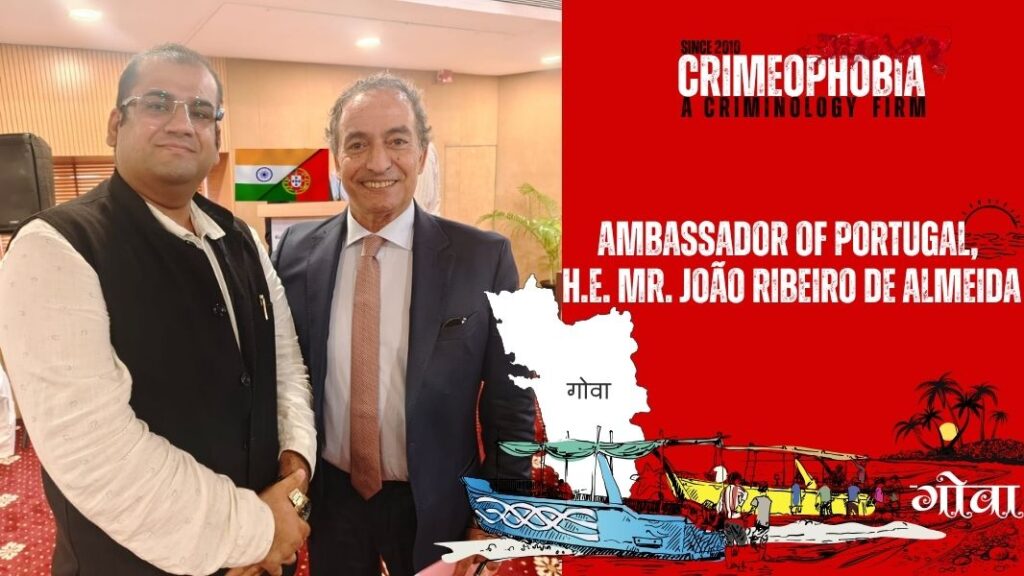
Fourth Generation, Final Call: Will India’s Goa State Finally Exit Portugal’s Quiet Citizenship Empire?
By Special Correspondent
Mumbai: In what may go down as one of the most sarcastically ironic chapters in post-colonial history, the former Portuguese colony of Goa—long integrated into the Indian Union—might finally be on the brink of actual independence… from Portugal. As the third generation of Goan-origin Indians avail their Portuguese citizenship rights, the final generation now approaches what could be the last legal chapter in Portugal’s centuries-old dominion over India’s smallest state.
The revelation surfaced during a high-level interaction between Criminologist Snehil Dhall, Founder of Crimeophobia, and His Excellency Mr. João Ribeiro de Almeida, the Ambassador of Portugal to India. The two discussed the ongoing eligibility of Goan-origin Indians for Portuguese citizenship, a policy born from Goa’s colonial past and now strangely manifesting as a transnational privilege in the 21st century.
“Portugal had committed that four generations of Goan-origin Indians will be eligible for Portuguese citizenship,” confirmed Ambassador Almeida. “Currently, the policy is supporting the third generation.” The dialogue sparked a wider debate: If three generations have already received Portuguese passports, and only one generation remains—does that mean India’s smallest state is still symbolically under Portugal’s control?
In an unusual quirk of global diplomacy, Portugal is perhaps the only nation on Earth allowing a foreign (Indian) residential address on a national passport—essentially issuing a European document with a sovereign Indian location printed inside. The symbolic message? While flags may have changed, ownership seems to be in a grey zone.
Snehil Dhall, speaking with a criminologist’s precision and a diplomat’s restraint, highlighted the legal and psychological implications of this anomaly. “Goa partially still follows the Portuguese Civil Code. The fact that the world’s largest democracy permits the world’s smallest former colonial power to issue a passport with an Indian address is either genius diplomacy or colonial leftovers dressed as privilege.”
As Goa approaches the final generation of this unusual citizenship inheritance, questions arise about identity, sovereignty, and international law. Will India finally be free of its last colonial hangover? Or will the Portuguese continue to quietly “own” a piece of land through a passport clause that no other nation would dare allow? The Portuguese were known for their brutal conversion of Hindus to Christianity. Although Goa is a land of temples, it continues to be perceived as a Christian state, where tourism is primarily focused on beaches, churches, and Christian culture—solely due to Portuguese influence. Nevertheless, with major colonization influence in India, they had lost to the British.
In the backdrop of this discussion lies Portugal’s reinvention on the global stage. Now proudly represented in the highest echelons of both the United Nations General Assembly and the European Union Parliament, Portugal is subtly reclaiming its voice—not through warships but through wellness retreats, diplomacy, and Ayurveda. Reports suggest that even His Majesty King Charles III visited Portugal for two weeks to avail Indian Ayurvedic treatments, bypassing Western medicine in favour of traditional Indian herbs.
While this may be great PR for Portugal, it adds another layer of satire to the story. A European king seeking Indian healing in a country that once colonized India, while Goans hold EU passports with Indian addresses… is this globalization, or just sophisticated colonialism? Portugal’s offer to deepen bilateral relations, with plans for an Indo-Portuguese Legal and Cultural Forum, diaspora rights reforms, and heritage preservation collaborations, is undoubtedly a positive step forward. But beneath the diplomatic pleasantries lies a pressing question for New Delhi: Is this special treatment for Goa a sign of respect—or a refusal to let go?
India may have won freedom in 1947, but for Goa, the final countdown to real independence may just be beginning—via the last page of a Portuguese passport as the final eligible Goan generation prepares to claim their EU-linked status.
